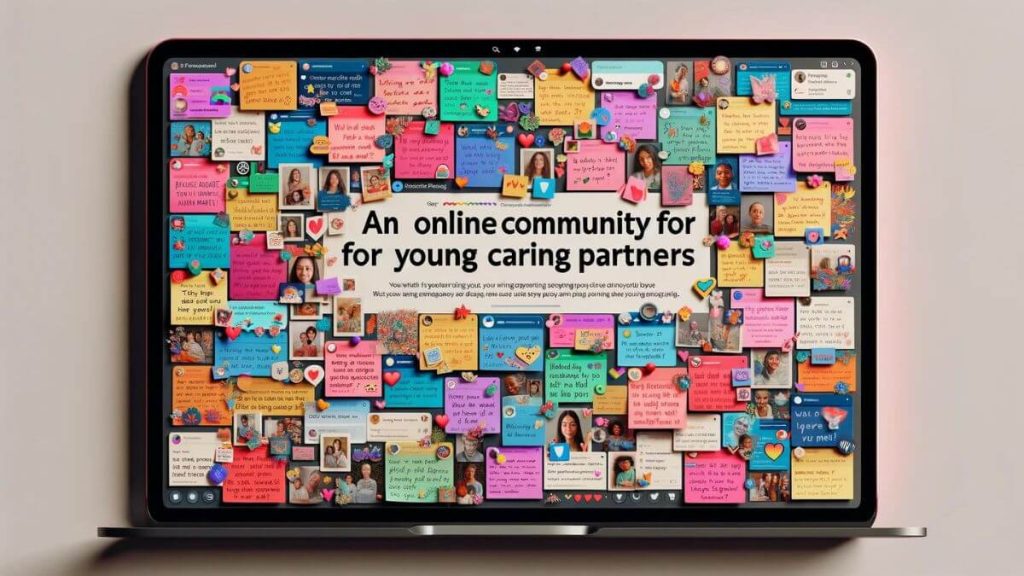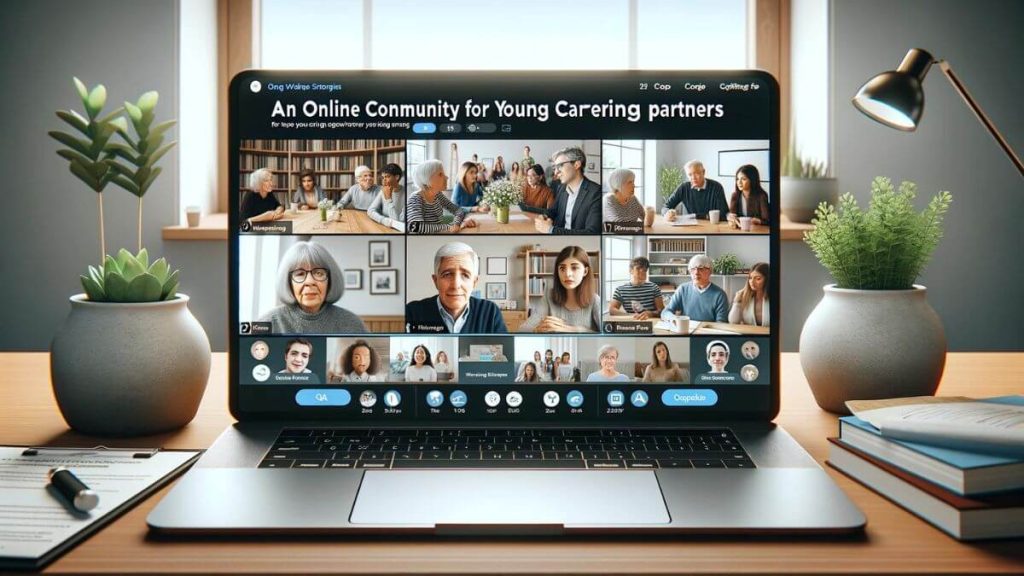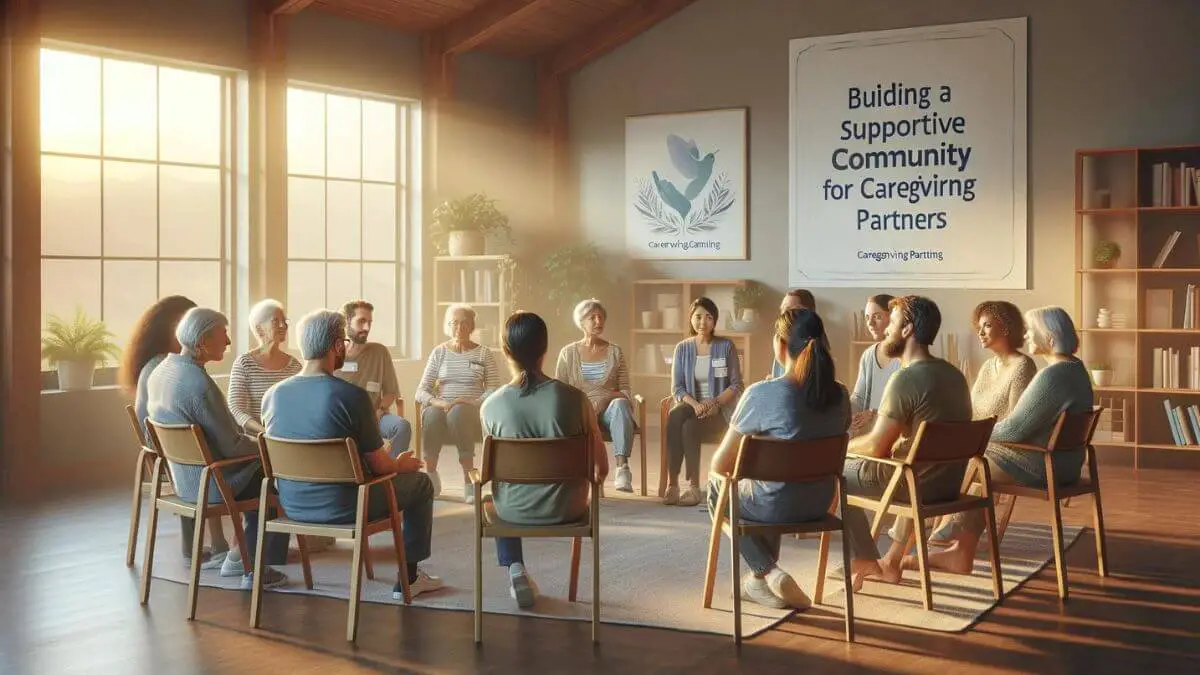Building a Supportive Community for Caregiving Partners
Building a supportive community for caregiving partners is rarely spoken of. This is why I decided to start this blog, to provide a sense of community we can talk about and spread awareness of us, caregivers, feeling sidelined by our partner’s chronic illness.
Building a supportive community for caregiving partners involves creating a network of resources, emotional support, and practical assistance. This community fosters collaboration and sharing of experiences among caregivers, offering guidance, respite services, and educational materials to aid in the challenges of caregiving.
- Building a Supportive Community for Caregiving Partners
- Challenges Faced by Family Caregivers
- The Power of Partnerships in Caregiving
- The Importance of Respect, Trust, and Vulnerability in Partnerships
- Building Successful Community Partnerships
- Ensuring Healthy Endings in Partnerships
- Creating Community Agreements for Partnerships
- The Impact of Caregiver Support Groups
- Moving Forward and Creating a Brighter Future
- Source Links for Building a Supportive Community for Caregiving Partners
Building a Supportive Community for Caregiving Partners
Imagine spending a decade loving and caring for someone who battles chronic illnesses like endometriosis and fibromyalgia. That was my reality as a devoted husband to my wife, who faced daily physical and emotional challenges. This journey shaped me into the man I am today, teaching me resilience, compassion, and the power of advocacy. Witnessing my wife’s strength and determination inspired me to share our story and offer support to other caregivers.
Through my blog, I not only share my knowledge and expertise but also connect with fellow caregivers, providing a space where we can uplift and empower one another. It’s a therapeutic outlet for me, allowing me to process my own emotions while offering practical advice and resources.
I’ve discovered the incredible value of caregiver support groups and online forums, where individuals facing similar situations can find solace, advice, and a sense of community.
Building a supportive caregiving community is essential. Caregivers need access to resources, information, and a network of understanding individuals who can offer guidance and share their own experiences.
By advocating for caregiver support groups, online forums, and caregiver resources, we can create a nurturing and empowering environment where caregivers can thrive. Together, as a caregiving community, we can make a difference in the lives of those who selflessly care for their loved ones.
Challenges Faced by Family Caregivers
Being a family caregiver comes with its own set of challenges. Recent research has shown that caregivers are facing increased demands and complexity in their caregiving responsibilities. Many caregivers are providing more intensive care, especially in the later stages of the caregiving journey. Additionally, there has been a rise in the number of younger caregivers seeking support.
One of the main challenges confronted by family caregivers is the difficulty in accessing resources and support networks within their communities. In fact, a staggering 60% of caregivers report struggling to find the necessary resources they need. These challenges directly impact the caregivers’ well-being and capacity to provide care effectively.
To address these challenges, it is essential for caregivers to prioritize self-care and wellness. Taking care of yourself is not a luxury but a necessity. Engaging in activities that promote physical and mental well-being can help you maintain your energy levels and resilience. Remember, you cannot pour from an empty cup.
Caregiving Tips for Self-Care
- Make time for regular exercise or physical activity to reduce stress and improve overall health.
- Seek out support from caregiver networks and online forums where you can connect with others who understand your experiences.
- Practice mindfulness and relaxation techniques, such as deep breathing or meditation, to reduce anxiety and promote emotional well-being.
- Delegate tasks and ask for help when needed. Remember, you don’t have to do it all alone.
- Take breaks and prioritize your own needs. It’s okay to set boundaries and say no when necessary.
By prioritizing caregiver self-care and building strong networks, you can overcome the challenges you face and navigate your caregiving journey with greater resilience and well-being.

The Power of Partnerships in Caregiving
Partnerships have a transformative impact on the caregiving journey, empowering caregivers and providing them with the support and resources they need. By joining forces with organizations and experts in the caregiving space, the Family Caregiver Alliance (FCA) extends its reach and develops programming that directly benefits caregivers.
Collaborative initiatives between FCA and its partners encompass a wide range of activities, including hosting caregiver conferences, providing specialized training programs, facilitating support groups, and creating educational resources. These endeavors strengthen the caregiver network, fostering a sense of community and empowerment.
Through partnerships, caregivers gain access to valuable information, and learn from experts and their peers. They can attend conferences where they acquire new skills, gather information on the latest caregiving techniques, and find support from others facing similar challenges.
Support groups, which are often facilitated by FCA and its partners, offer a safe space where caregivers can share experiences, exchange advice, and find emotional support. These groups play a vital role in building a supportive network, reducing isolation, and enhancing caregiver well-being.
In addition to direct support, partnerships also play a pivotal role in advocating for caregivers at a policy level. FCA and its partners work together to shape policies that benefit caregivers, lobbying for improved resources, funding, and accessibility to essential services.
Moreover, partnerships enable research collaborations, contributing to a deeper understanding of caregiving challenges and the development of innovative programs. These initiatives aim to address the evolving needs of caregivers and to improve the overall quality of care provided to care recipients.
Partnerships are the cornerstone of building a strong and supportive community for caregiving partners. By harnessing the power of collaboration, caregivers can access a wealth of resources, find solace in a network of peers, and advocate for positive change. Together, we can empower caregivers and create a brighter future for caregiving.
| Benefits of Partnerships in Caregiving | Examples |
|---|---|
| Increased reach and support for caregivers | Collaborative caregiver conferences |
| Access to specialized training programs | LGBTQ dementia care training |
| Facilitation of support groups | Caregiving workshops |
| Creation of educational resources | Advance care planning training |
| Policy advocacy for caregiver rights | Promotion of caregiver-friendly policies |
| Research collaboration and innovation | Development of evidence-based programs |
The Importance of Respect, Trust, and Vulnerability in Partnerships
Creating successful partnerships within the caregiver community requires a foundation built on respect, trust, and vulnerability. These values are essential in establishing an atmosphere where joint collaborations can thrive and caregivers can find the support they need.
Respect is the cornerstone of any partnership. It involves seeing, hearing, valuing, and respecting each other as equal partners in the caregiving journey. By recognizing and appreciating the unique strengths and perspectives that each partner brings, we can create a harmonious and supportive caregiver community.
Building trust is crucial in forging strong partnerships. Honest and transparent communication is the key to establishing trust among partners. By openly sharing thoughts, concerns, and challenges, we can build a solid foundation of trust that strengthens our collective ability to navigate the complexities of caregiving.
Vulnerability plays a significant role in fostering meaningful connections and authentic partnerships. It is about being open and allowing ourselves to be seen, heard, and understood. When we embrace vulnerability, we create an environment where partners can express themselves freely and connect on a deeper level, supporting each other through the ups and downs of the caregiving journey.

Building Successful Community Partnerships
Building successful community partnerships is essential in empowering caregivers and creating a supportive caregiver community. These partnerships are built on personal connections, honesty, and showing up for one another. By establishing strong relationships and fostering transparency, effective partnerships can be formed to address the needs of caregivers and provide valuable resources and support.
When building community partnerships, it is important to be present and authentic. Being fully engaged and committed to the partnership shows caregivers that their empowerment and well-being are a priority. Additionally, offering grace and understanding in the face of challenges can help maintain a positive and collaborative environment.
Regular check-ins and open communication are also key to successful partnerships. By staying in touch and being proactive in discussing any concerns or issues, caregivers can feel supported and heard. This allows for necessary adjustments and improvements to be made to better meet the needs of the caregiver community.
Before committing to a partnership, it is crucial to take the time to get to know potential partners. Understanding their goals, values, and commitment to caregiver empowerment ensures compatibility and alignment of objectives. Having uncomfortable conversations, such as addressing potential conflicts of interest or differing perspectives, is necessary to establish a solid foundation for collaboration.
Remember, caregiver empowerment, caregiver community, and caregiver networks are strengthened through strong and meaningful partnerships. By building successful community partnerships, we can contribute to the well-being and resilience of caregivers and ensure the availability of valuable resources and support.
Benefits of Building Successful Community Partnerships
By recognizing the value of building successful community partnerships, we can create a caregiver network that is stronger, more supportive, and equipped with the resources needed to empower caregivers and enhance their well-being.
| Benefits | Description |
|---|---|
| Expanded resources | Partnerships allow for the pooling of knowledge, expertise, and resources, resulting in a greater range of support and services available to caregivers. |
| Shared experiences | By collaborating with others in the caregiver community, caregivers can connect with peers who have faced similar challenges and find support through shared experiences. |
| Mutual learning | Partnerships offer opportunities for mutual learning and growth as organizations and individuals share best practices, innovations, and strategies to better support caregivers. |
| Influence and advocacy | Collective partnerships have a stronger voice in advocating for policy changes and improvements in caregiver support systems, elevating the visibility and importance of caregiver empowerment. |
| Enhanced reach | Partnering with other organizations and networks expands the reach and impact of caregiver resources, making them more accessible to a wider caregiver community. |
Ensuring Healthy Endings in Partnerships
Not all partnerships work out in the long run, and it’s important to handle the ending of a partnership respectfully. Taking the time to disengage responsibly can help avoid burning bridges and ruining relationships. Acknowledging difficulties, offering incentives to those who shared their stories, and practicing the power of the pause can all contribute to a healthy ending. It’s crucial to recognize when a partnership is no longer working and to have conversations about necessary changes or transitions.
When a partnership reaches its natural conclusion, it’s important to reflect on the journey shared and express gratitude for the support and collaboration that took place.
Ending a partnership doesn’t necessarily mean burning bridges, it can be an opportunity to cultivate new connections and collaborations in the future.
Recognize and appreciate the contributions of partners by offering incentives or tokens of appreciation. This gesture not only shows gratitude but also helps maintain positive relationships within the caregiving community. A genuine exchange of experiences and shared stories can serve as a catalyst for personal growth and a deeper understanding of the challenges faced by caregivers.
One valuable practice when ending a partnership is to embrace the power of the pause. Taking a step back and allowing space for reflection allows the opportunity to gain clarity and evaluate the partnership objectively. It’s essential to consider the reasons why the partnership is no longer working and explore potential areas for improvement.

Stakeholder Incentives
| Stakeholder | Incentives |
|---|---|
| Caregiver | Access to exclusive caregiver resources and support groups |
| Community Organizations | Recognition for their contributions and collaborative efforts |
| Experts | Opportunities for continued professional development and networking |
When ending a partnership, it’s crucial to communicate openly and honestly with all parties involved. Transparent conversations can help identify areas for improvement, changes, or transitions that may be necessary. By addressing challenges and concerns head-on, caregivers and their partners can work together to ensure a healthy and respectful ending.
Remember that ending a partnership does not diminish the value of the collaboration or the shared goals that were initially pursued. Instead, it opens up new possibilities for growth, innovation, and the creation of future partnerships within the caregiver community.
Creating Community Agreements for Partnerships
When it comes to building strong and successful partnerships, developing community agreements is essential. These agreements serve as the foundation upon which partnerships are formed, establishing shared tenets, rules, and expectations. Over time, they may need to be adapted or changed to reflect the evolving needs of all parties involved.
In order to create strong partnerships within the caregiver community, it is important to prioritize open and honest communication. Discussing potential triggers, making space for difficult conversations, and recognizing the strengths and weaknesses of each organization are all key elements in fostering collaborative and effective partnerships.
Furthermore, inclusivity is crucial in creating community agreements. By involving individuals with lived experience in the decision-making process, partnerships can benefit from diverse perspectives and insights. Taking the time to get to know potential partners on a personal level is also important, as it helps build trust and understanding.
Key Elements in Community Agreements
- Shared tenets, rules, and expectations
- Open and honest communication
- Discussions on potential triggers
- Making space for difficult conversations
- Recognition of strengths and weaknesses
- Involvement of people with lived experience
- Personal connection and understanding
By establishing community agreements, partnerships within the caregiver community can thrive, creating a supportive environment for caregivers and ensuring the availability of necessary resources.
Community agreements are essential in creating a cohesive and supportive caregiver community. By establishing shared expectations, fostering open communication, and embracing the strengths of each partner, we can ensure that caregivers have access to the resources and support they need.
The following table provides a visual representation of the key elements in community agreements.
| Key Elements | Description |
|---|---|
| Shared tenets, rules, and expectations | Establishes a common understanding of the values and guidelines that govern the partnership |
| Open and honest communication | Encourages transparent and effective communication between partners |
| Discussions on potential triggers | Addresses topics or situations that may cause discomfort or conflict and plans how to handle them |
| Making space for difficult conversations | Creates an environment where challenging discussions can take place openly and respectfully |
| Recognition of strengths and weaknesses | Acknowledges and utilizes the unique skills and expertise of each partner organization |
| Involvement of people with lived experience | Ensures that those directly impacted by caregiving have a voice in decision-making processes |
| Personal connection and understanding | Builds trust and rapport through getting to know potential partners on a personal level |

The Impact of Caregiver Support Groups
Caregiver support groups are invaluable resources that provide caregivers with the strength, compassion, and support they need in their caregiving journeys. These groups serve as safe spaces where caregivers can freely share their experiences, fears, and triumphs with others who truly understand. By joining caregiver support groups, you empower yourself and gain access to a network of individuals facing similar challenges, creating a sense of camaraderie and understanding that can be truly empowering.
In these support groups, you will find a community of caregivers who offer not just empathy, but practical advice to help you navigate the complexities of caregiving. They provide valuable insights and strategies that can assist you in managing the physical, emotional, and mental demands of caregiving. Through these connections, you can find solace, guidance, and camaraderie that helps prevent burnout and reduce feelings of isolation.
Caregiver support groups also offer practical assistance to both the caregiver and the care recipient. You can gain access to a wealth of resources, services, and professional advice that can improve the quality of care provided. By connecting with others who have shared similar experiences, you can tap into a vast pool of knowledge and expertise, enabling you to become a more effective caregiver.
In summary, caregiver support groups play a pivotal role in the lives of caregivers, providing much-needed strength, compassion, and support. They offer a sense of community, validation, and empowerment, while also equipping caregivers with practical tools and resources to enhance their caregiving experience. By joining a caregiver support group, you not only take care of your own well-being but also ensure that you can provide the best possible care for your loved ones.
Moving Forward and Creating a Brighter Future
Building a supportive community for caregiving partners is an ongoing process. By embracing the values of respect, trust, and vulnerability, and by creating strong partnerships, we can empower caregivers and ensure they receive the support they need.
It is important to continue advocating for the development of caregiver support groups and resources. These vital resources provide a sense of belonging and connection for caregivers who often face isolation and overwhelming responsibilities. By actively participating in caregiver support groups and promoting their establishment, we can foster a caregiver community that is well-equipped to handle the challenges of caregiving.
Moreover, incorporating the voices and experiences of people who have lived through caregiving can significantly impact decision-making processes. By including them in the design and implementation of caregiver support programs, we can ensure that the resources and strategies developed are relevant, effective, and truly meet the needs of the caregiver community.
By collaborating and focusing on building care team partner support groups, we can create a brighter future for family caregivers. Enhancing their well-being and effectiveness in caregiving will not only benefit the caregivers themselves but also the individuals they care for. Let us join hands, advocate for caregiver resources, and work together to build a supportive and compassionate community for all caregiving partners.


About Me
Hi, I’m Lucjan! The reason why I decided to create this blog was my beautiful wife, who experienced a lot of pain in life, but also the lack of information about endometriosis and fibromyalgia for men...
Source Links for Building a Supportive Community for Caregiving Partners
- https://www.caregiverrelief.com/empowering-family-caregivers-building-care-team-partner-support-groups-for-enhanced-caregiving/
- https://www.careinnovations.org/resources/10-ways-to-create-effective-community-partnerships/
- https://www.caregiver.org/resource/better-together-serving-more-caregivers-through-community-partnerships/
